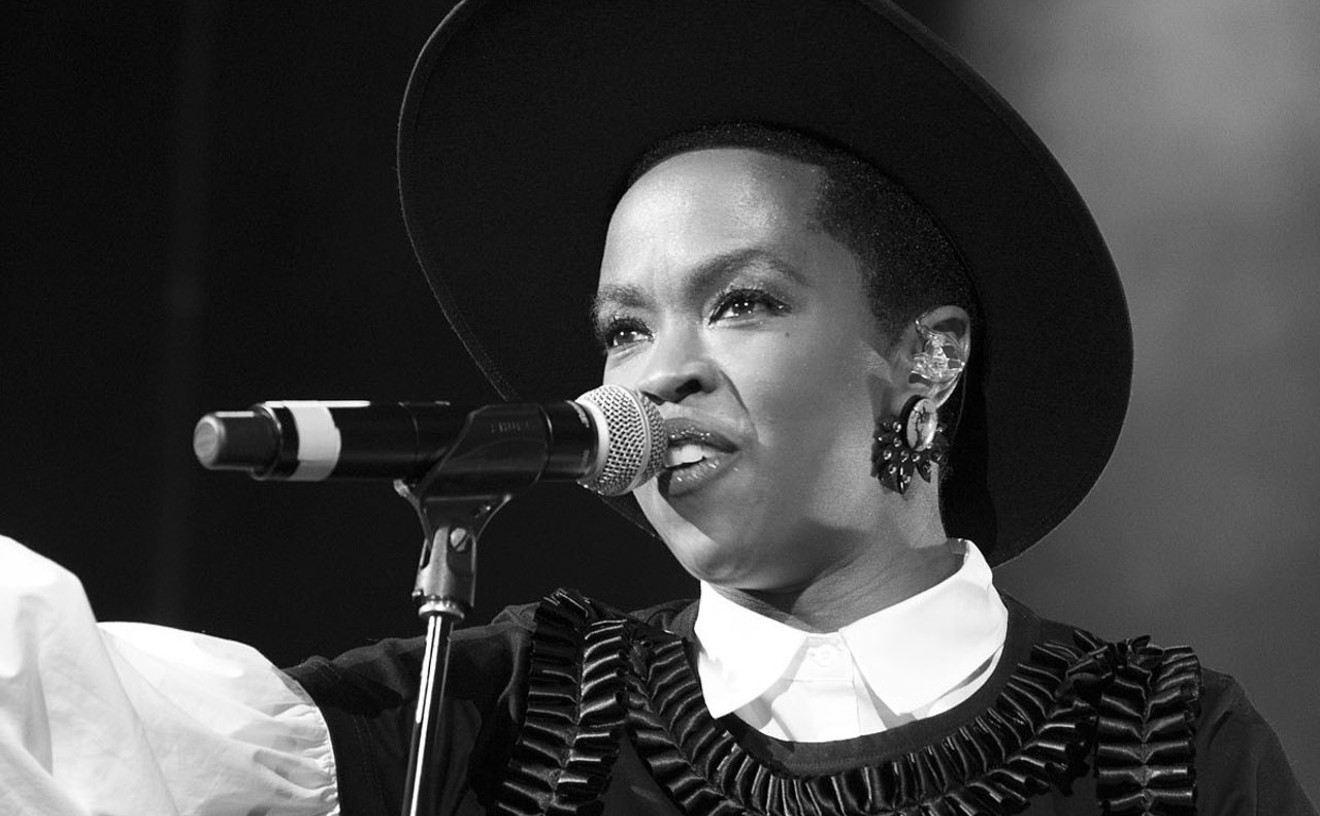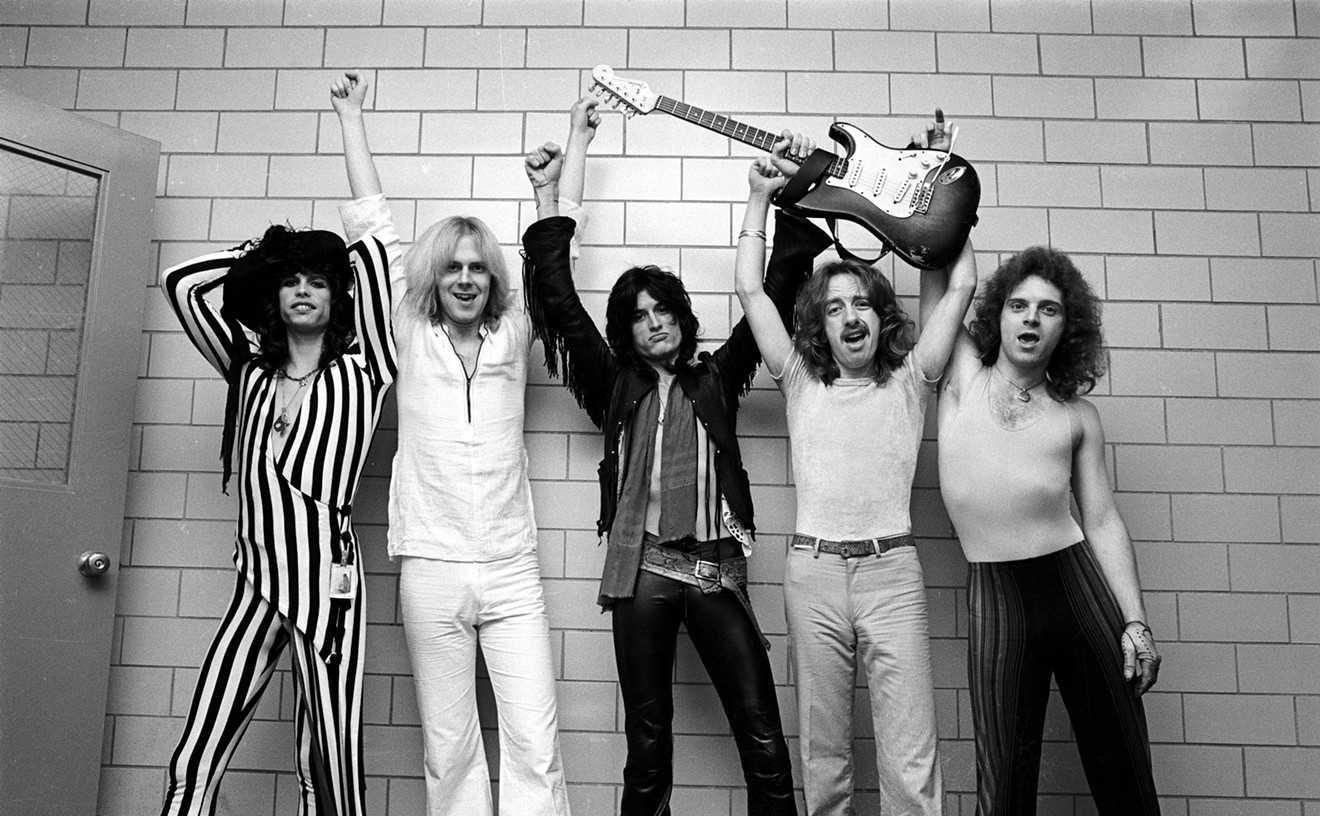With all the references getting tossed around, it's easy -- and perhaps valid -- to look at Cherish the Light Years as a cultural event, a record that most aptly that demonstrates, along with that Sleigh Bells' Treats, the broad and far reaching fingers of the early-to-mid 2000s hardcore/emo/punk scene as artists from that era branch into darkwave and dance-pop.
Eisold took some time from lounging in Southern France to speak with Up on the Sun about his "scrap" with Fall Out Boy, his hardcore past and what it's like to start singing. The band plays Coachella this Friday, and Phoenix at the ICYC on Sunday, April 17.
UOTS: Your musical past is really interesting. You've made a transition from being in hardcore bands into Cold Cave, which is more ambient, Gothic and New Wave. What's the biggest difference between the styles, personally, as a singer? I imagine it's a lot easier on the throat.
WE: It is. It's easier on the throat, but it's harder to do. I had to kind of learn how to sing. In the past it was never anything I had to work [on] it was just more of the release that I cared about. Aside from that, in the past I was singing and writing to other people's songs, and now I'm writing lyrics to my own songs.
UOTS: Which is a whole different thing.
WE: The music dictates how the vocals work. [The vocals on this record] are different from the other records, which had kind of hushed vocals. With this record, for some reason, I couldn't really do vocals until the songs were almost 100% completed [which resulted in a different sound].
UOTS: The vocals on this record are very large sounding. It's expansive. The intensity from your past work seems to carry over to this record.
WE: I think. definitely. The past two releases, the other ones, were so... the vocals were clouded and shielded and buried under effects and pitch shifting. I wanted the idea of Cold Cave to exist on its own without too much information about it. [Which is why the records] Have other people on the record covers and didn't include credits in the album, things like that. This time, I guess I wanted to take more credit for it, and wear it on my sleeve.
UOTS: That confidence comes through. Have you always been interested in New Wave and Industrial sounds?
WE: Yeah, of course. I mean, that was my first love, that kind of music, and it's always stayed with me. It was never something I thought I would play, but my whole life I feel like every decision I've ever made was based around music. And when I decided to make my own pop band, it was just what I wanted to do at the time. I'm really happy I did it.
I've had a few projects, but I found myself without a band, and I started thinking that the reason bands come to an end is different personalities, people want to do other things that wouldn't really belong on your record, and it's kind of why I started a band that was mine, and I wasn't concerned with the quality of the music, I just wanted to have something that sounded honest to me, that I could create myself regardless.
UOTS: This record features guests on the record. How do you go about populating your records?
WE: It just a matter of getting it as far as I could with a song, with what I could play. Once I would get to the point where I would need a guitar or a bass, I would ask a friend, who was around to come play it real quick. That's pretty much the process, it's just song by song, and I would build them until they couldn't really exist any longer without the part they needed. It was people I felt comfortable saying 'just play it like this' or 'here's a reference' and it kind of work.
UOTS: In your bio it says that you don't like dance clubs, though you ostensibly make dance music.
WE: I do like clubs, at times. But I do enjoy the idea of clubs more than the actual club. I find myself fixiating too much on the reality of what's happening around other than just letting go and enjoying myself. I think too much about what people are doing or the reasons they are there. I think in those cases, I just like to enjoy music alone more than with other people.
UOTS: How does that translate to your live performances, where you are obviously sharing with large groups of people?
WE: I think it's different. I get to take some liberty with why people are there; to see what we have to offer. I think there's a form of communication between people that want to be there. That said, I guess I am still unsure about performing right now. I like touring because it breaks up the monotony of doing things, but I also never intended to be in a touring band again. It just kind of happened.
UOTS: It's an interesting place to find yourself in. You obviously toured for a very long time with other projects, and now you are back in the same situation.
WE: Yeah. I feel really honored to keep doing it, actually. I knew I'd be playing music my whole life, but I didn't think I would be able to continue playing music that people cared about or paid attention to. I don't take it lightly, I am very appreciative about being able to do that. If someone wants to come see what I do, I want to play to them.
UOTS: You were involved in a lawsuit against Fall Out Boy. What are the details of that situation?
WE: Basically, I just co-wrote some songs with them, and it got really blown out of proportion. It was a little confusing, and it got even more confusing, because I never talked about it, but it wasn't like anything that crazy happened. Some of those people are still friends of mine, and I just wrote some lyrics for three songs, and one song they ended up writing music around some lyrics I had written.
UOTS: So there wasn't anything dramatic about it?
WE: No, not at all. A rumor just turned into a rumor and there's really nothing to talk about.
UOTS: Well, people love a juicy story.
WE: Of course, and I kind of like that that exits. It's just there's nothing that I can do.
UOTS: Especially at the time, when you were going out of your way to keep things mysterious and anonymous. With this new record, you seem to be stepping more into the spotlight.
WE: That's accurate. I think I was right to [remain anonymous] because anytime my name is attached to something, people are like, 'oh, this guy from a hardcore band is making this kind of music.' I don't think it's bad, but a lot of times people approach it with this sort of apprehension and I want it to just be judged for itself. Initially at least. I'm 32, and those were bands I played in when I was 19.
UOTS: And that gets focused on as much as the music you are doing right now.
WE: It can. And that's okay, it's just...
UOTS: I think that with the new record there's a tangible connection between those two styles of music.
WE: Yeah.
UOTS: It's a dance record, but it's also very aggressive. I think the New Wave-as-informed-by- hardcore angle makes sense with this record.
WE: Yeah, yeah. Maybe it does. I guess it might be referential to my past, but I can't really hear it that way.
UOTS: It's hard to hear it when you are inside of it.
WE: Exactly.











